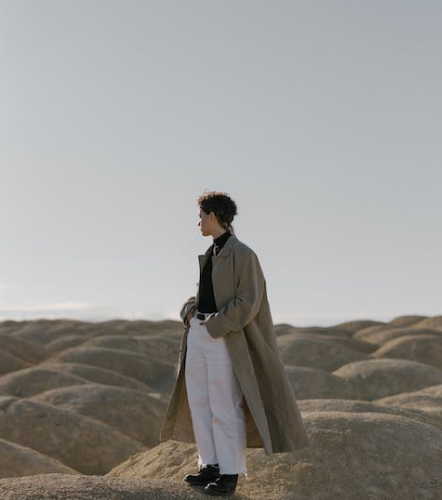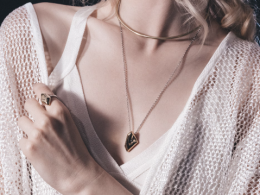In a world driven by perfection, where flawless photoshopped models grace magazine covers and Instagram influencers showcase an idealized version of themselves, the fashion industry is experiencing a significant shift. Embracing flaws has become not only a trend but a movement that challenges conventional beauty standards. In this essay, we’ll explore the intriguing concept of imperfection in fashion, its profound impact on the industry, and how it has revolutionized the way we perceive beauty.

Redefining Beauty: Imperfection as a Trend
Fashion has often been criticized for promoting unrealistic ideals of beauty. The airbrushed images of supermodels and the constant pursuit of perfection have been the norm for decades. However, the winds of change are sweeping through the fashion world. The trend of embracing imperfections is breathing fresh life into an industry that has long been associated with unattainable beauty standards.
This shift in perception is not merely a fleeting trend; it represents a profound cultural change. Imperfections are no longer hidden but celebrated. Stretch marks, scars, and freckles are no longer blemishes but features that make individuals unique and relatable. Models and celebrities who openly showcase their “imperfections” are now celebrated for their authenticity.
The Rise of Authenticity: Real People as Models
One of the most significant changes brought about by the imperfection revolution is the rise of everyday people as fashion models. Traditional runway models with their flawless complexions and statuesque figures are sharing the spotlight with a diverse array of individuals, each with their own unique set of “flaws.”
Brands and designers are recognizing the power of authenticity in connecting with consumers. The move towards inclusivity, featuring models of different ages, sizes, and ethnic backgrounds, celebrates the real world. This paradigm shift in the industry speaks to the idea that fashion is for everyone, regardless of how closely they resemble the conventional standards of beauty.
Celebrating the Unconventional: Ugly Chic
In the pursuit of imperfection, we encounter the phenomenon known as “ugly chic.” What was once considered unattractive or out of style is now celebrated as the height of fashion. Chunky sneakers, oversized glasses, and clashing patterns are just a few examples of how unconventional elements have become fashion staples.
This celebration of the “ugly” is a testament to the ever-evolving nature of fashion. It’s a nod to individuality and personal style that doesn’t conform to traditional norms. The result is a diverse, exciting, and often humorous blend of styles that defy the rules of conventional beauty.
The Power of the DIY Movement: Customization and Personalization
Imperfection in fashion extends beyond physical appearance; it also encompasses a do-it-yourself (DIY) mindset. The rise of customization and personalization is empowering individuals to embrace their flaws and quirks. It’s no longer about following the latest trends; it’s about making fashion your own.
Customization allows individuals to express their uniqueness, transforming clothing into a canvas for self-expression. From embroidered denim jackets to hand-painted sneakers, the possibilities are endless. The result is a fashion culture that celebrates individuality, encouraging people to take pride in their distinctiveness.
Sustainability and Imperfection: A Perfect Match
The imperfection movement goes hand in hand with the growing emphasis on sustainability in the fashion industry. Embracing flaws is not just about celebrating individual quirks; it’s also about acknowledging the imperfections in the fashion system itself.
Fast fashion, with its relentless pursuit of perfection, often leads to excessive waste and environmental damage. In contrast, sustainable fashion recognizes that perfection is unattainable, but progress is possible. Eco-friendly brands embrace the imperfect nature of materials and manufacturing, promoting the beauty of imperfection through upcycling, recycled materials, and ethical practices.
The Impact on Mental Health and Body Positivity
Beyond the realm of clothing, the imperfection movement has far-reaching implications for mental health and body positivity. The fashion industry’s previous focus on perfection has contributed to self-esteem issues, body dysmorphia, and unrealistic beauty standards. Embracing flaws, both in fashion and in ourselves, fosters a healthier and more positive self-image.
This shift in perspective encourages individuals to accept their bodies as they are and embrace their unique features. It’s a call to authenticity, reminding us that no one is flawless, and that’s perfectly okay. The fashion industry’s role in promoting these values is instrumental in helping individuals find self-confidence and self-acceptance.
Challenges and Controversies: Striking the Right Balance
While the imperfection movement has brought about many positive changes, it’s not without its challenges and controversies. Some argue that it may lead to the normalization of unhealthy habits, while others question whether it’s a genuine shift or just another marketing strategy.
Striking the right balance between embracing imperfections and avoiding the glorification of destructive behaviors is essential. The fashion industry, along with consumers, must navigate this path carefully to ensure that the movement continues to promote authenticity and inclusivity without causing harm.
Conclusion: The Beauty of Imperfection
In a world where the pursuit of perfection has long dominated the fashion industry, the embrace of imperfection represents a breath of fresh air. It challenges outdated beauty standards, encourages authenticity, and celebrates the uniqueness of every individual.
The imperfection movement has redefined beauty, making it more inclusive and relatable. It’s a celebration of our flaws, quirks, and individuality. As we continue to navigate the ever-changing landscape of fashion, let us remember that the real beauty lies in our imperfections, and the future of fashion is brighter when we embrace our flaws with open arms.












